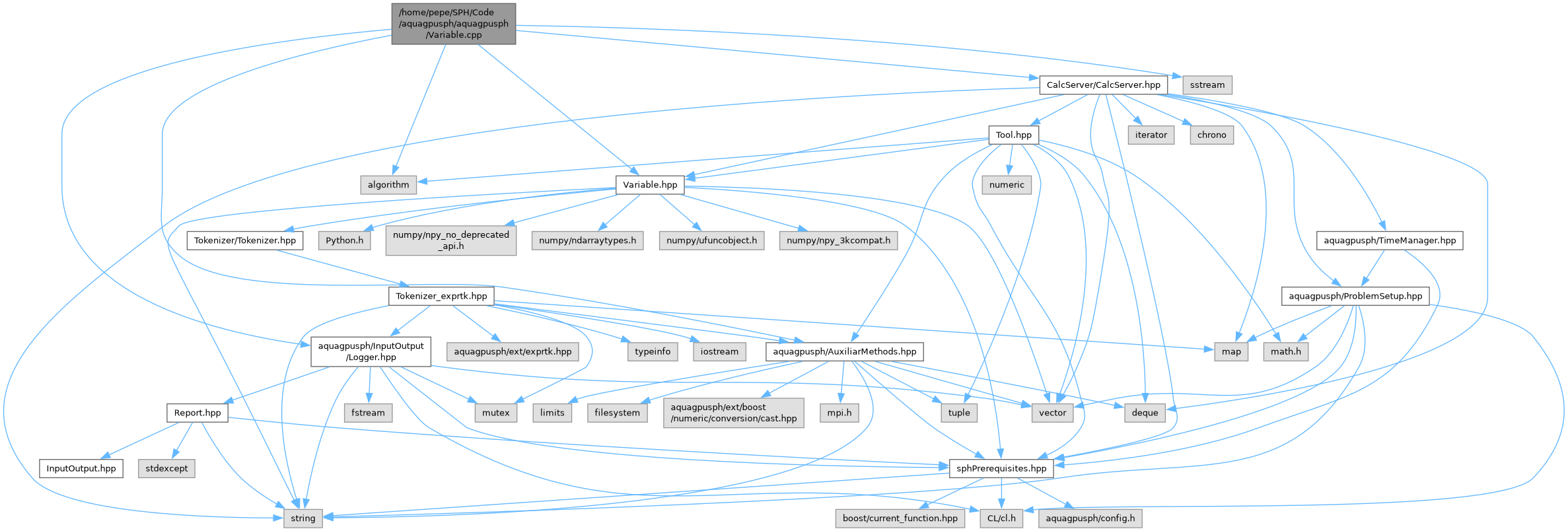Variable.cpp File Reference
Virtual variables environment to allow the user define/manipulate the variables used in the simulation externally. (see Aqua::InpuOutput::Variable and Aqua::InpuOutput::Variables) More...
#include <algorithm>#include <sstream>#include "Variable.hpp"#include "AuxiliarMethods.hpp"#include "InputOutput/Logger.hpp"#include "CalcServer/CalcServer.hpp"
Include dependency graph for Variable.cpp:

Namespaces | |
| namespace | Aqua |
| Main AQUAgpusph namespace. | |
| namespace | Aqua::InputOutput |
| Input/Output data interfaces. | |
Macros | |
| #define | __DEFINE_AQUA_VEC(NAME, TYPE, DIMS, NPTYPE) |
| #define | SPLIT_EXPR_AND_CHECK(var_name, expr, exprs_out, n) |
| #define | SCALAR_SOLVER(vartype, toktype) |
| #define | VEC_SOLVER(vartype, toktype, n) |
| #define | REG_VEC_BLOCK(TYPE) |
Functions | |
| std::string | Aqua::InputOutput::npy_type_name (int np_type) |
| template<typename T> | |
| const std::string | Aqua::InputOutput::valptr_as_string (T *ptr, unsigned int n) |
| Stringify a value pointer. | |
| std::string | Aqua::InputOutput::tokNameToVarName (const std::string &name) |
| Convert the names populated at the tokenizer to variable names. | |
Variables | |
| static std::ostringstream | Aqua::InputOutput::pyerr |
Detailed Description
Virtual variables environment to allow the user define/manipulate the variables used in the simulation externally. (see Aqua::InpuOutput::Variable and Aqua::InpuOutput::Variables)
Macro Definition Documentation
◆ __DEFINE_AQUA_VEC
| #define __DEFINE_AQUA_VEC | ( | NAME, | |
| TYPE, | |||
| DIMS, | |||
| NPTYPE ) |
◆ REG_VEC_BLOCK
| #define REG_VEC_BLOCK | ( | TYPE | ) |
Value:
else if (!type.compare(#TYPE)) { \
TYPE ## Variable* var = new TYPE ## Variable(name); \
if (value.compare("")) { \
TYPE val = solve<TYPE>(name, value); \
var->set(&val); \
} \
_vars.push_back(var); \
}
◆ SCALAR_SOLVER
| #define SCALAR_SOLVER | ( | vartype, | |
| toktype ) |
Value:
template<> \
vartype \
Variables::solve(const std::string& name, const std::string& value) \
{ \
SPLIT_EXPR_AND_CHECK(name, value, value_strs, 1); \
toktype val = tok.solve<toktype>(value_strs[0]); \
tok.registerVariable<toktype>(name, val); \
return (vartype)val; \
}
◆ SPLIT_EXPR_AND_CHECK
| #define SPLIT_EXPR_AND_CHECK | ( | var_name, | |
| expr, | |||
| exprs_out, | |||
| n ) |
Value:
std::vector<std::string> exprs_out = split_formulae(expr); \
if (exprs_out.size() < n) { \
std::ostringstream msg; \
msg << "Failure parsing the expression \"" << expr \
<< "\" for variable \"" << var_name << "\"" << std::endl; \
LOG(L_ERROR, msg.str()); \
msg.str(""); \
msg << n << " fields required instead of " << exprs_out.size() \
<< std::endl; \
LOG0(L_DEBUG, msg.str()); \
throw std::runtime_error("Invalid number of fields"); \
}
◆ VEC_SOLVER
| #define VEC_SOLVER | ( | vartype, | |
| toktype, | |||
| n ) |
Value:
template<> \
vartype \
Variables::solve(const std::string& name, const std::string& value) \
{ \
vartype out; \
const char* extensions[16] = { "_x", "_y", "_z", "_w", \
"_yx", "_yy", "_yz", "_yw", \
"_zx", "_zy", "_zz", "_zw", \
"_wx", "_wy", "_wz", "_ww" }; \
SPLIT_EXPR_AND_CHECK(name, value, value_strs, n); \
for (unsigned int i = 0; i < n; i++) { \
toktype val = tok.solve<toktype>(value_strs[i]); \
tok.registerVariable(name + extensions[i], val); \
out.s[i] = val; \
} \
return out; \
}
Generated by